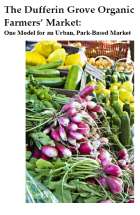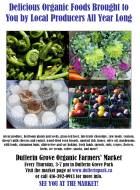
Pages in this Folder:

Related Folders:
See also Department Site Map
Publications:
Market-related videos
Comments?
For the basics, see
- Website & Privacy Policies
- How To Get Involved
- The Role of the Park
Search options:
Department Site Map
Custodians:
Comments on the 2006 Census for Agriculture
Released on December 2, 2008 and on May 16, 2007
A summary by David Cohlmeyer of Cookstown Greens
As Ontario’s farm population continues its long decline, down another 6% from 2001 and now representing only 1.5% of the Ontario population, changes to our food system in a democratic society need to be initiated and followed through by city-folk more than ever.
The average age of Ontario farmers has continued rising from 51 years in 2001 to 53 in 2006, the highest of all occupations (the national labour force average is 41 years). Quebec, with more munificent support for young farmers, has only 7% of farmers over 65 years, while Canada-wide, farmers over 65 comprise of a whopping 11%. Even more concerning is that Ontario’s young farmers, those under 35 years of age, have decreased by 25%! Farm families report a median income of $56,000, only 13% less income than general population families. Those Ontario farmers claiming more off-farm income than farm income rose from 46% to 50% from 2001 to 2006. With farmers’ income from wages totalling 62%, actual farm income only averages a mere 6% of a farmer’s total income! The rest is made up of government pension and child benefits, investment income, and non-farm self-employment.
Large farms (over $250,000 gross receipts) increased by 14% as farms continue to be combined, while small farms (under $250,000 gross receipts) decreased by 10%. With 44% of all farms having expenses higher than receipts, this dreadfully poor performance is most pronounced in very small farms (under $25,000 gross receipts), and beef and specialty meats producers. Very large farms (over $1,000,000 gross receipts) are no more profitable than large farms.
Even though immigrants represent an increasing share of the general population (from 15% in 1971 to 20% in 2006), they represent a steadily decreasing share of our farm population (8.5% in 1971 to 7% in 2006). They are, however, well represented as fruit and nut tree growers (27%), and greenhouse and floriculture operators (21%).
From 2001 to 2006, Ontario farmers generally took better care of their soil, with no-till and composted manure practices rising from 30% to 46%. Non-certified Organic farms now total 5% and Certified Organic farms 1.5% of all farms.
Farmers are now moving from less profitable endeavours into more rewarding ones. The number of Ontario greenhouses has increased by 21%. The most significant increasing crops are blueberries (+17%), (wine) grapes (+15%), carrots (+5%), squash (+15%), onions (+7%), and lettuce (+12%). Decreasing crops include apples (-14%), sweet corn (-15%), beans (10%), and tomatoes (-7%). Fruit and vegetable processing capacity has dropped by 7%. There are more pigs, more milk from fewer cows, more eggs from fewer chickens, and 35% more bison.
Projects City-folk can Adopt to Create some Good News
Suggestions from David Cohlmeyer, a concerned farmer
The 2006 census reports clearly demonstrate that children of farmers are not staying on family farms. There is just not enough profit in producing foods to entice them to work two jobs to make ends meet. “Wanna-be” farmers and immigrants from cities do want to farm, but they do not have access to the land and quota (the cost to obtain the permit to supply such products as chickens, eggs, milk, and turkeys) required to begin producing local foods on a large enough scale to be sustainable. As a result, older farmers, with their wealth of local experience, become less able to pass on their valuable knowledge.
City-folk are needed to alleviate this risky situation by refusing cheap food dumped from the U.S. and other countries. City-folk could help our farmers realize their true costs and encourage them to refuse to sell at losses. There is no justice with Canada having the cheapest food in the world (United Nations Food Costs as a per cent of disposable income are: Canada 9%, U.S. 11% (i.e. 20% higher), England 18% (i.e. double), Germany 22%, Italy 26%, France 27% and Japan 28%). Our governments are aware of this nagging problem, but they are loath to commit to the “good medicine” of raising food prices. The U.S., China, and Chile are not foolish to provide us with cheap food (and they will fight to continue to do so). City-folk need to assure politicians that they will be supported for taking up this long-term international dispute.
Our governments do have a number of subsidy programs to assist farmers to survive the governments’ cheap food policies, but they are primarily aimed at very large farms (over $1,000,000 gross receipts) and are difficult for environmentally-concerned farmers to access. These programs are generally not available until well after they are needed, and require farmers to first put up their own cash to qualify for a matching government grant. More commonly, these assistance programs are merely a subsidized insurance policy, which encourages risky mono-cropping. Since diversified organic farms are by nature self-insured, they rarely incur a disaster large enough to qualify for this assistance. The best way city-folk can support farmers is to buy local, which will help farmers build the cash required to participate in these subsidy programs, or they could donate to a fund established to help Ontario farmers access government subsidy programs. City-folk can also encourage governments to provide the support that actually promotes sustainable farming practices.
Marketing is a typical inadequacy of Ontario farmers. City-folk can assist farmers with marketing initiatives and help them access government funding. They can also transfer the current policy of export subsidies to one that promotes import replacements. Another possibility is to lobby for specialty quotas, which would permit the use of the free-range, pastured chickens dearly loved by our chefs, and Bed and Breakfasts could actually use their own (or a neighbour’s) eggs as opposed to the generic, commercially-packaged eggs currently required by law.
We are doing a pretty good job of teaching local agronomics to interested young and immigrant farmers. But we have not yet found a way to effectively help them obtain access to secure, quality land. There are not many proven models in existence that demonstrate how to do this. Surely we have some imaginative city-folk who could create some models.
The benefits of an intriguing, quality, year-round local food supply would be a tremendous boost for the tourism, hospitality, and agri-tourism industries. Also, the overall economic benefits are tremendous from creating something of great value from local sunlight, water, air, soil, and labour. Please contact or join Slow Food Toronto toronto.slowfood.ca when you are ready to help our local farmers thrive.
|
Read more News. | ||





 Printer friendly version
Printer friendly version